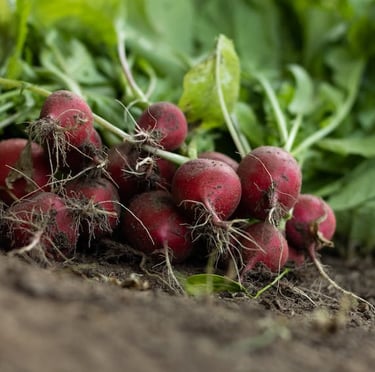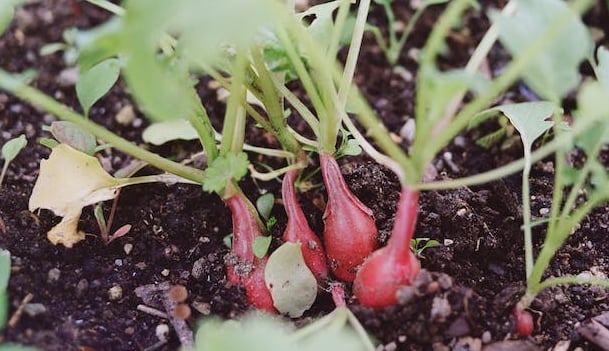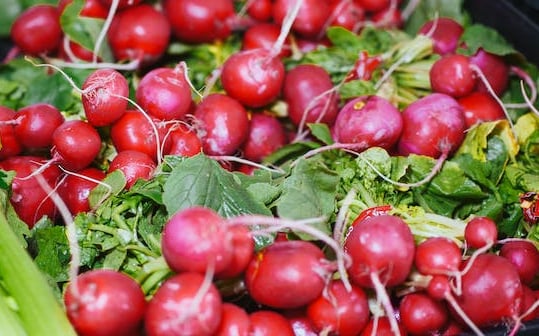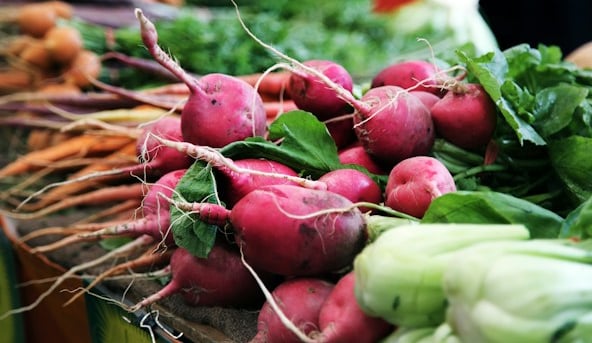The Best Way to Properly Harvest Radishes
For the best radish harvest, you need to carefully pull them out of the soil when they are about the size of a large marble for the most flavor and freshness.








Identifying the Right Time to Harvest
Radishes mature quickly, typically ready for harvest 3-4 weeks after planting. When we harvest radishes we look for radishes that have reached about 2.5 cm (1 inch) in diameter, this size indicates they are ready to pull and ripe. Use the top of the radish that is peeking out of the soil as an indicator.
Steps for Harvesting Radishes
Check the Size: Gently brush away some soil around the top of the radish to assess its size without disturbing the plant.
Loosen the Soil: If the soil is compacted, lightly loosen it around the radish to make pulling easier. When our experts garden we use mostly small shovels for this task.
Pull Carefully: Grasp the radish at the base of its greens and pull straight up. If the radish resists, wiggle it slightly to help free it from the soil.
Clean and Prep: Once harvested, remove the leafy tops to prevent them from drawing moisture from the radish. Wash the radishes under cool water to remove any soil.


Expert Tips for a Successful Harvest
After growing radishes, it is best to harvest them in the morning. We do this because then the radishes are crispy, fresh, and flavorful.
Overcrowded radishes should be thinned out early in their growth cycle to ensure proper development.
What Happens If You Leave Radishes in the Ground Too Long?
Leaving radishes in the ground too long can result in oversized, tough, and woody vegetables similar to harvesting beetroot or other root vegetables.
Additionally, based on our multiple harvests, the flavor may become excessively spicy or bitter, detracting from their usual crisp, peppery taste but there are still ways to save radishes that are left too long in the ground.






Can You Eat a Radish After It Bolts?
Yes, you can eat bolted radishes, but the quality may not be as desirable. Bolting, which is when a plant starts to flower and go to seed, often results in a tougher, more fibrous texture and a stronger, less pleasant flavor like when harvesting Romaine Lettuce.







Sources
Nature and Sustainability uses only high-quality sources, including peer-reviewed studies to support the facts we describe in our articles. Please read our editorial policy to learn more about how we keep our content accurate, reliable, and trustworthy.
Harvesting vegetables: https://yardandgarden.extension.iastate.edu/how-to/vegetable-harvest-guide, https://extension.umn.edu/planting-and-growing-guides/harvesting-and-storing-home-garden-vegetables
Information and facts on harvesting radishes: https://www.wikihow.com/Harvest-Radishes
Growing radishes general information: https://extension.umn.edu/vegetables/growing-radishes, https://extension.usu.edu/yardandgarden/research/radishes-in-the-garden
Share this article:




Article By:
Calin has been in the garden industry for 5 years and knows a lot about gardening and plants. He owns this website and is responsible for most of the content.
Reviewed By:


Florin, a more technical guy, is responsible for designing, reviewing updating the articles but also optimizing for SEO so that everything we publish is deam good.


